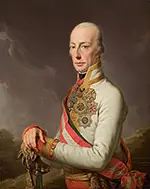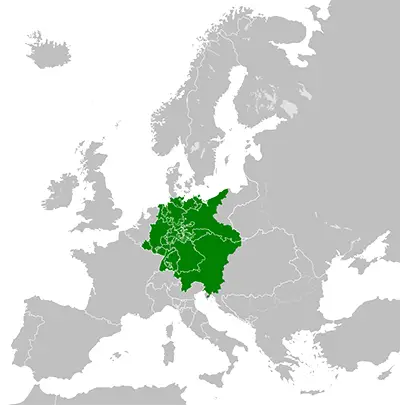The German Confederation
The German Confederation banded together various Central European kingdoms and former German states for five decades in the 19th Century. 
Rulers of what is now Germany had been part of the Holy Roman Empire for centuries, with the title of those leaders varying between King of Germany and King of the Romans (both being effectively the same thing). The last ruler of the Holy Roman Empire was Francis II (left), who abdicated after the defeat of imperial forces to France at the Battle of Austerlitz in 1806. French Emperor Napoleon Bonaparte replaced the Empire with the Confederation of the Rhine, which comprised 35 former German states and was in existence for seven years. Significantly, not joining the Confederation were Austria and Prussia, both of whom fought on against France. After the Allied victory at Leipzig in 1813, many of those former German states joined the Sixth Coalition, declaring war on France. The Allies dissolved the Confederation on Nov. 4, 1813. 
The Congress of Vienna in 1815 created the German Confederation, a new grouping of 40 states that included the Austrian Empire and the Kingdom of Prussia, both of which were large and powerful. The German Confederation was set up with the idea that the stronger states would dominate. The Federal Assembly, known as the Confederate Diet, met in Frankfurt and was nominally in charge of what government there was; presiding over the Assembly was a delegate from Austria, who was head of state in all but name. The Diet had many delegates but only 17 votes:
Members of the Confederation pledged to conduct mutual defense. The Diet had the power to declare war, and providing that war power was the German Federal Army. What the Confederation didn't have was any kind of economic directive. Prussia provided that with the Zollverein, in 1834; other states joined, in fits and starts, for the next few decades. The Diet played no part in any member states' responses to the Revolutions of 1848. Some member states' responses to the uprisings were markedly different from others. Despite the stated purpose of mutual defense and the implied extension of mutual respect, Austria and Prussia went to war in 1866. Prussia won that very short war in dominant fashion and then dissolved the German Confederation. Present-day countries having some or all of their lands within the boundaries of the German Confederation were these:
|
|
Social Studies for Kids
copyright 2002–2024
David White




